




 |
   |
 |
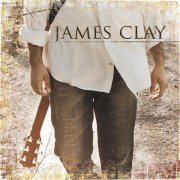 |
James Clay (2004, 48.25) **½/T½ |
|
| I Still Believe Franklin Park On Your Knees Judah's Song One at a Time Anyway To Be With You Wicked Woman |
Send Salvation Sabotage Millstones |
|
Current availability:
Chamberlin used:
Virginian James Clay was apparently 'whisked away by his mother at the age of ten to join a religious cult in Georgia.' (Why is this legal?) However, according to the site from which I've stolen this information, 'good came of it, in that it forced Clay to read God's Word in search of guidance and answers' [their capitalisation, my italics]. That's the first time I've ever heard forced religious conversion described as 'good'. I clearly move in the wrong right circles. Surprisingly, his eponymous debut, recorded in his early twenties, is nowhere near as bad as that suggests, at its best on passable Christian roots-rock opener I Still Believe, the hard rock of Wicked Woman (is this misogynistic nonsense? I can't make out the lyrics) and slowburn closer Millstones, although the slushy balladry of Anyway and Send Salvation's cod-reggae drag it down somewhat.
Producer Phil Madeira (Vigilantes of Love, many other Christians) plays Chamberlin, with chordal strings on On Your Knees, chordal flutes and a string melody on One At A Time and flutes on To Be With You, although the block string chords on Franklin Park don't have that tape-replay ring to them. This is one of the less irritating CCM albums I've heard lately, making it a shame that Clay doesn't seem to have recorded again.
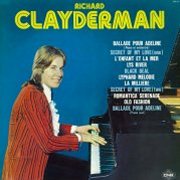 |
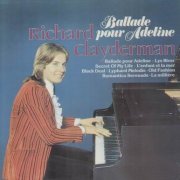 |
Richard Clayderman [a k.a. Ballade pour Adeline] (1977, 36.55) **½/T |
|
| Ballade pour Adeline (Piano & Orchestre) Secret of My Life (One) L'Enfant et la Mer Lys River Black Deal Lyphard Melodie La Milliere Secret of My Life (Two) |
Romantica Serenade Old Fashion Ballade pour Adeline (Piano Seul) |
||
Current availability:
Mellotron used:
Philippe "Richard Clayderman" Pages is regularly quoted as 'the most successful pianist in the world', having sold over seventy million records worldwide. OK, not quite in, say, Billy Joel or Elton John territory, but not bad for a conservatoire student who threw up a promising career as a concert pianist to help support his family. The story goes, Pages attended an audition in 1976 for a pianist to record a piece written by noted French producer Olivier Toussaint for his daughter, Ballade Pour Adeline, beating around twenty other attendees, due to a combination of his approach, technique and good looks.
The single sold a phenomenal twenty-two million copies, precipitating an album, variously titled Richard Clayderman or Ballade pour Adeline, containing an uneasy mixture of the expected piano schmaltz and a handful of more interesting tracks, including L'Enfant Et La Mer, Black Deal, with its funky Clav work (two of the album's less schmaltzy pieces) and the vaguely bluesy Secret Of My Life (Two). Old Fashion [sic.], on the other hand, while not especially interesting, is a case study in what happens when you get a classical musician to play rock'n'roll piano.
Doubtless due to a limited budget, as well as his ubiquitous piano, Clayderman plays Hammond, Clavinet, ARP, Moog and Korg synths and... Mellotron. I know; I didn't expect it, either, but that's why this is here. He adds choirs to L'Enfant Et La Mer, Black Deal and La Milliere, although the choir on Lyphard Melodie sounds real. Well, what can I say? I'm not exactly going to recommend that you go out to trawl your local charity shop/thrift store to find a copy of this, but it's far less offensive than I'd expected, with a couple of passable tracks. Little Mellotron, but, frankly, I'm amazed it's there at all. I'm slightly surprised that this is so hard to find on CD, but Clayderman's millions of devoted, elderly female fans aren't going to be interested in hearing their idol experiment; they just want schmaltz (third time I've used that term in this review) and lots of it.
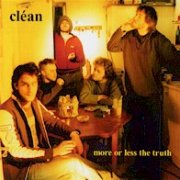 |
More or Less the Truth (2002, 44.39) **½/T |
|
| Stronger Man Right Now Room 16 Under Over U Say Hilliard Cleaner |
Game White Paradise Strange Journey |
|
Current availability:
Mellotron used:
Cléan (not 'Clean') are a Swiss band who've relocated to Bristol, of all places; mind you, it's the centre of all things trip-hoppy, I suppose, so they could've done worse. To be honest, though, what they're doing on More or Less the Truth is pretty dated, with the sort of sample 'manipulation' (for want of a better word) that slid out of favour in the late '80s. The album starts well enough, but they run out of ideas about halfway through, resorting to pointless random triggering of samples by the seventh or eighth track; a sure sign of lack of anything new (or at all) to say, I suspect.
Matt Sampson guests on Mellotron on two tracks: Hilliard has nothing audible, although there's a multiply-repeating lengthy choir sample running through the track, but White Paradise has a repeating grungy string part, although its lack of variety makes me wonder just how real it is. Well, they do actually credit the Mellotron, so you'd like to think it's genuine... Anyway, I can't really recommend this, unless you're absolutely desperate to hear a band writing lyrics in their second (or possibly third) language, trying to recreate a several year-old style.
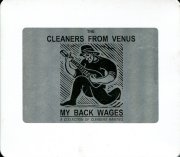 |
My Back Wages (2000, recorded 198?-199?, 62.46) ***½/T |
|
| Crane Driver Gulf War Song Incident in a Greatcoat Bag of Dust Haunt Your House Drowning Butterflies Red Guitars & Silver Tambourines Everytime I Go Up You Should Have Called |
Gate Crashing Oyster Park Stay Lit Bodecea Jones Smash Your Watch Arcadian Boys Clara Bow Princess of Suburbia Finding My Own Way Home |
|
Current availability:
Mellotron used:
Martin Newell is a minor legend in his lifetime, a composer of large numbers of superb, witty pop songs that no-one's ever heard, most released under the name The Cleaners From Venus. I first became aware of them after sometime member Giles Smith eulogised them in his memoir, Lost in Music, so it's good to see that Newell's still ploughing the same furrow, thirty years on. 2000's My Back Wages (ho ho) is a collection of previously-unreleased odds'n'sods, although I've got no idea when any one track dates from. Highlights include opener Crane Driver, Incident In A Greatcoat, Red Guitars & Silver Tambourines and Gate Crashing Oyster Park; this is what 'indie' music should be: truly independent and every bit as good as anything the majors can throw at us. Who said 'better'?
XTC's Dave Gregory plays Mellotron on Drowning Butterflies, with a strident multi-string (string section?) part running through most of the track. I'm not going to pretend that this album is in any way coherent, but then, its contents were originally recorded for various projects, so that shouldn't really be an issue. It's taken me this long (and a Mellotron connection) to discover Martin Newell, but having done so, I shall delve further into his work.
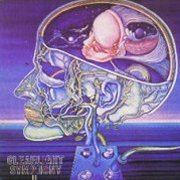 |
Symphony (1973, 41.00) ****/TTTTT1st Movement2nd Movement |
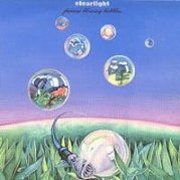 |
Forever Blowing Bubbles (1975, 37.07) ****/TTTChansonWithout Words Way Ergotrip Et Pendant ce Temps la Narcisse et Goldmund Jungle Bubbles |
Current availability:
Mellotrons used:
Clearlight (NOT 'Clearlight Symphony') were the brainchild of French keyboard player and Gong co-conspirator Cyrille Verdeaux; in fact, side two of his/their debut album, Symphony, features three of Gong's then current line-up as Verdeaux's backing band, including the inimitable Steve Hillage. The album is absolutely excellent, with definite musical similarities to Gong (they even shared their UK label, Virgin), trippy jamming stuff going on throughout, along with some seriously fiery playing from all concerned. Verdeaux's Mellotron work is absolutely beyond reproach, too, bloody great slabs of strings and choir all over the place, with cellos added for colouring. 2nd Movement (a.k.a. side two) probably has marginally less Mellotron than side one, but I can't give this album anything less than the full five Ts. Magnificent!
They followed up two years later with Forever Blowing Bubbles, producing another great album with some fantastic playing, particularly Jean-Claude d'Agostini's Hillage-like guitar work. It's difficult to pinpoint a standout track, but the heavy jamming of Chanson works well and in direct contrast, Narcisse Et Goldmund is a beautiful ballad, underpinned at the end with some Mellotron choirs. Other Mellotron work on the album includes Without Words, with background string chords, while Way features the choirs quite heavily, but Et Pendant Ce Temps La is the album's standout Mellotron track, with an upfront melodic strings part to die for.
See: Gong
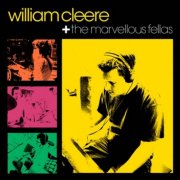 |
William Cleere & the Marvellous Fellas (2011, 40.47) ***½/T |
|
| Labor Day High Flying Bird Kara Leaves How Do You Learn to Go On The Girl From NYC Side Effects Someone to Fill Your Shoes |
Soul Goodnight Moon |
|
Current availability:
Mellotron used:
William Cleere is a vocalist/pianist, loosely in the Ben Folds mould, which isn't to say they're interchangeable. Cleere tends more towards balladry (in a good way, mind) and keeps the humour in check, but as a general comparison, I could think of worse. To be honest, there probably isn't a bad track on William Cleere & the Marvellous Fellas, possibly at its best on bluesy opener Labor Day, Leaves, Side Effects and closer Goodnight Moon.
Producer Allen Clapp plays real-sounding Mellotron strings on Leaves, with a nicely-arranged part that eschews the all-too-common block chord approach. In some ways, this is music from another age, although Cleere's eclecticism makes it impossible to pin the album down to, say, '40s swing or '50s jazz. Not one for your inner rock'n'roller, but recommended nonetheless.
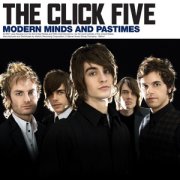 |
Modern Minds & Pastimes (2007, 42.52) ***/T |
|
| Flipside Jenny Happy Birthday Addicted to Me I'm Getting Over You When I'm Gone Headlight Disco The Reason Why |
All I Need is You Long Way to Go Mary Jane Empty |
|
Current availability:
Chamberlin used:
The Click Five (TC5, or TCV), were a rather muso Boston-based indie-end-of-powerpop outfit, throwing a little pop/punk-lite into the mix, going by their second album (of three), 2007's Modern Minds & Pastimes. The album's an infuriating game of two halves, at its best on I'm Getting Over You's powerpop, the energetic When I'm Gone and Headlight Disco, which spoofs said genre beautifully, although mainstream nonsense like The Reason Why and All I Need Is You drag proceedings down, sadly.
Producer Mike Denneen plays Q Division Studio's MusicMaster 600 Chamberlin, with chordal flutes on opener Flipside, background strings on When I'm Gone and both sounds on Mary Jane. One of those albums where you have to take the good with the bad, I'd say.
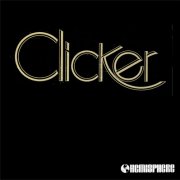 |
Clicker (1973, 38.20) ***½/TMr. FortunateKeep on Tryin' Maple Tree Spring Pick Yourself Up Flyin' Feathers Castle Du Monde's Back Room |
Current availability:
Mellotron used:
Going by their eponymous 1973 release, Clicker (awful name!), from Madison, Wisconsin, were a sort-of prog outfit, although, like so many others at the time, they tended to temper their musical aspirations with some straight-ahead rock and radio-friendly balladry. The album kicks off with a couple of rather average (and, therefore, more 'radio-friendly') efforts, making the short instrumental Maple Tree the first really good track, followed by the sort-of Yes-lite (or proto-Starcastle) of Spring. The tedious Pick Yourself Up aside, it gets better from here on in: Flyin' Feathers is a superb little guitar instrumental, sounding like the engineer was seriously messing with the tape-speed, while Castle, although relatively short, is an excellent mock-mediaeval effort. This leaves the rather odd, fifteen-minute Du Monde's Back Room, which opens with nearly two minutes of amusing explanatory spoken-word, followed by several minutes of jazzy jamming, shifting into Dick Wiegel's unaccompanied electric guitar solo, strangely pre-dating Steve Howe's similar (if more adventurous) one on Relayer's Sound Chaser the following year, finishing up with more jamming. Quite unlike anything else I've heard, frankly, which is a recommendation of sorts.
Keys man Jeff Eisberner plays Mellotron on Keep On Tryin', with supporting string and flute parts that you can't help wishing were higher in the mix. To be brutally honest, Clicker isn't ever going to be the greatest obscurity you'll ever unearth, although it certainly has its moments. Not, however, worth it for the Mellotron. Incidentally, to absolutely no-one's surprise, it seems that Clicker were, in many ways, a typical bar-band of the era, playing their own material amongst a slew of covers, apparently including several Wings tunes and, later in the decade, the Star Wars theme.
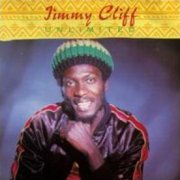 |
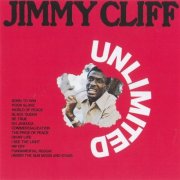 |
Unlimited (1973, 45.26) ***/TT½ |
|
| Under the Sun, Moon and Stars Fundamental Reggay World of Peace Black Queen Be True Oh Jamaica Commercialization The Price of Peace |
On My Life I See the Light Rip-Off Poor Slave Born to Win |
||
Current availability:
Mellotron used:
Jimmy "Cliff" Chambers' best work is generally regarded to be that recorded by legendary Jamaican producer Leslie Kong, who died in 1971, along with the following year's soundtrack to The Harder They Come. His seventh album, 1973's Unlimited was, therefore, his first non-Kong/soundtrack work and while lacking the intensity of his earlier work, it's far from being a bad album, opener Under The Sun, Moon And Stars and Commercialization amongst its better tracks.
Leslie Butler plays Mellotron, with a humorous descending octave string line on Fundamental Reggay, a full-on pseudo-orchestral string part on Be True and chordal strings and solo flute on Commercialization, The Price Of Peace and I See The Light (plus cellos on the latter). Not the strongest reggae album ever, then, but a perfectly respectable effort, with some nice, upfront Mellotron use.
 |
Dirty King (2009, 45.07) **½/T |
|
| Haunted Dirty King Not Your Boy Red and Blue Henry Emily Career Suicide Love Gun |
We Are the Wolverines Falling Overboard Animal Farm |
|
Current availability:
Mellotron used:
The Cliks (from clit/dick, apparently) are unusual in that their best-known lineup is exclusively part of the LGBT community, giving rise to the situation whereby vocalist Lucas Silveira lives as a man and appears male, yet sings with an obviously female voice. How much the band's identity affects the makeup of their audience is unknown, but I'd imagine Warners have had to be spoken to fairly sternly to avoid the stereotype trap. Their third album, 2009's Dirty King, is, unfortunately, a fairly ordinary indie-style release, although the band cover a fair bit of stylistic ground within the genre, including rock'n'roll (the title track), drippy acousticness (Not Your Boy) and a (real) string-driven waltz (Emily).
Producer Sylvia Massy plays Mellotron, with rather generic flutes on Red And Blue and a rather better string part (including some drastic pitchbends) on closer Animal Farm. I really can't recommend this album for the music, although two decent Mellotron tracks make it slightly more bearable. Generic.
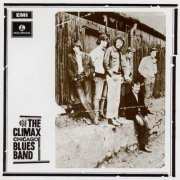 |
The Climax Chicago Blues Band (1969, 44.38) ***/½ |
|
| Mean Old World Insurance Going Down This Road You've Been Drinking Don't Start Me Talking Wee Baby Blues Twenty Past One A Stranger in Your Town |
How Many More Years Looking for My Baby And Lonely The Entertainer |
|
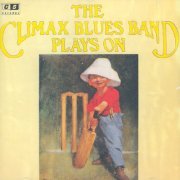 |
Plays on (1969, 43.55) ***½/TFlightHey Baby Everything's Gonna Be Alright Yeh Yeh Yeh Cubano Chant Little Girl Mum's the Word Twenty Past Two Temptation Rag So Many Roads City Ways Crazy 'Bout My Baby |
Current availability:
Mellotrons used:
The Climax Blues Band, still sporting their 'Chicago' addition at this point, played a form of progressive blues that had more than a little in common with contemporaries Fleetwood Mac, albeit with less guitar and added sax. Their debut, 1969's The Climax Chicago Blues Band, is a decent enough record of its type, although it sounds a little tame compared to what Peter Green and co. would get up to over the following year, not to mention Led Zeppelin... Many of its songs are typical blues boom repertoire (Wee Baby Blues/Wee Wee Baby, How Many More Years, a.k.a. Zep's How Many More Times), although I'd imagine it was pretty radical at the time. Its best track is also the only one with any Mellotron content, the eight-minute slow blues And Lonely, with some near-as-dammit inaudible Mellotron strings on the background from guitarist Derek Holt.
Plays on was their second album, capturing the essence of the era's blues/rock scene admirably, with fiery playing and the ability to step outside the 12-bar format, without slipping into the AOR stylings that would make them such a success in the States in the following decade. There's probably as many non-standard as standard blues tracks on the album, but the most 'out there' is side two's opener, Mum's The Word, a weird, keyboard-led instrumental, not actually blues at all, featuring Holt (now bassist) on Mellotron strings. My heat-damaged copy of the album has obviously had a hot coffee cup placed on it at some point (!) and the first two tracks on each side won't play properly, but you can still hear that this is a bit of a departure for the band and an area to which they wouldn't return after success hit.
 |
Living Like a Rich Man (1976, 36.13) **/TT |
|
| Living Like a Rich Man Linda Write Me a Letter Don't Give Me Your Lies Lovely Lady Living Here Without You Thanx a Lot We Can Make it if We Try Don't Shoot |
All in My Life You Can Count on Me |
|
Current availability:
Mellotron used:
British-born Canadian ex-pat Paul Clinch released what appears to be his sole album, Living Like a Rich Man, with his band, Choya, in 1976, a terribly mainstream pop/rock effort of its day, at its least tedious, funnily enough, on the proto-disco of Don't Shoot. Really? Not my favourite genre (spot the understatement), but it's the only thing here with any life to it at all.
Bruce Ley plays Mellotron, amongst other 'boards, with background strings and flute melodies on the opening title track and All In My Life and choir, strings and upfront flutes on wannabe epic Don't Give Me Your Lies, although the strings on Living Here Without You, We Can Make It If We Try and elsewhere are real. This actually attained semi-major label release status, its US version appearing on Buddah, but is not only unavailable now, but, I'd imagine, likely to remain that way. Probably for the best. Incidentally, the Canadian release adds a final track, Southbound Road; should I ever get to hear it, I'll report back on its Mellotronic status.
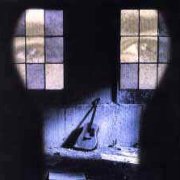 |
Hold the Keys (1998, 48.50) **½/½ |
|
| Hold the Keys What's That Do for Me Eye of the Storm Something to Tell Joe Take Time Endless Ambition Let Us Remember |
We're All Here A Moment in Peace The Loch We're All Here |
|
Current availability:
Mellotron used:
On his website, Brian Cline (who founded the embryonic Enchant, appearing on a couple of albums) describes his style as 'uncompromising music with a fresh approach', to which I can only say, "What does stale look like?" His debut, 1998's Hold the Keys, sounds like, to quote Allmusic, 'a male Sarah McLachlan' in its bland, adult contemporary format, akin to a secular CCM record, of all things. I can also detect hints of that sound prog metal bands make when they play ballads, which is quite fitting, if somewhat unwelcome. Anything even half-way decent? Possibly acoustic closer We're All Here.
Brian wrote to me, years ago, to tell me that he played Robert Berry's M400 on the album, albeit barely, with deeply background strings on Something To Tell, although the volume-pedalled, er, somethings on Joe don't appear to be Mellotronically-derived. Incidentally, the last two songs are generally referred to as 'bonuses', but I'm unable to trace a release without them, so have listed them as regular tracks.
See: Enchant
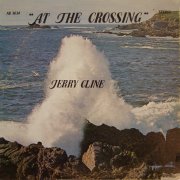 |
At the Crossing (197?, 26.41) */T |
|
| At the Crossing The Healer I've Never Loved Him Better Than Today I Stand Amazed He Giveth More Grace Lovest Thou Me Zion's Hill These Hands of Mine |
His Name is Wonderful I Should Have Been Crucified |
|
Current availability:
Mellotron used:
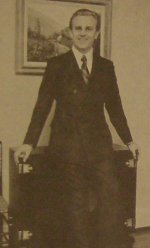 |
When Jerry Cline's name is mentioned, you'd been forgiven for saying, "Whom?" From Louisville, Kentucky, he's described on the rear sleeve of At the Crossing as 'one of the finest young gospel singers in America today'. Young? Gospel? I point you, ladies and gentlemen, to exhibit A: the picture of the estimable Jerry from said LP rear sleeve (right). OK, maybe he is young in this picture, despite his appallingly conservative appearance, but then, he's a Christian; what do I expect? He actually looks like the kind of man you wouldn't necessarily trust with small children; not that I'm saying he is, only that he has that air about him. Exhibit B: the album. Gospel? Sorry, but I consider gospel to be black church music, generally infused with some kind of joie de vivre. Believe me, there's no joie de vivre here...
At the Crossing is the most tedious, unexciting drivel you can imagine, Jerry's whiter-than-white voice hailing from another era; although the album's undated, the Mellotron puts it at some point in the '70s, despite all evidence to the contrary. Lyrically, there's not a single surprise here, although I couldn't stop laughing at the title of closer I Should Have Been Crucified. No comment, Jerry, no comment... Occasionally, guitarist/bassist/keys man Mel(vin) Pierce goes slightly off-piste with his arrangements, notably the ill-advised sitar (!) on The Healer (why?), the even more ill-advised attempt at funk guitar on I've Never Loved Him Better Than Today and the guitar-through-tape delay of His Name Is Wonderful, but not one track here summons up anything other than turgid, joyless, grey Christian conformity.
Pierce plays strangely effected Mellotron strings on He Giveth More Grace, giving them a strange underwater sound. Perhaps they were played underwater. Perhaps they should've been. Perhaps the entire album should've been recorded there, without breathing apparatus. Once again, folks, my pal Mark Medley brings you the very worst in American thrift-shop crud, lovingly converted to MP3 and buzzed across the Atlantic to yours truly. You know, if his sources dry up, I'll miss 'em. Vile, yet strangely compelling, although I can't imagine I'll ever play this shit again. Superbly appalling.
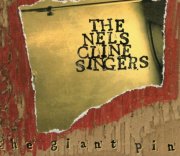 |
The Giant Pin (2004, 73.02) ***½/½ |
|
| Blues, Too Fly Fly He Still Carries a Torch for Her The Ballad of Devin Hoff The Friar Something About David H. Bright Moon |
A Boy Needs a Door Square King Spell Watch Over Us |
|
Current availability:
Chamberlin used:
Maybe surprisingly, jazz/improv guitarist Nels Cline's current gig is with Wilco, although, given his diverse career path over the last thirty years, maybe a sharp left turn like that should be expected. Another of his ongoing projects is the ironically-named Nels Cline Singers (they're instrumental), whose second album, 2004's The Giant Pin, is pretty much the kind of experimental, improv jazz you'd expect, with much atonal guitar work, albeit frequently in an unexpectedly quiet setting. Personal favourites include He Still Carries A Torch For Her and Square King (probably because they're about the least abstract things here), while I detect hints of Fripp on Something About David H., which can never be a bad thing.
Jon Brion plays Chamberlin, with flutes and cellos on Something About David H., although there's nothing obvious on Brion's other credit, closer Watch Over Us. Overall, then, not one for those who like their music highly structured, but avant-rock/jazz fans should go a bundle on this. Next to no Chamberlin, though, so don't bother on that account.
See: Samples etc.
 |
Let's Get Naked (2002, 15.44) ***/TTLet's Get NakedCold Waters The Final Run |
 |
This Crumbling Garden (2003, 20.28) ***/T½Intro (St. Christopher)Our Crumbling Garden Lover's Lie Skull Tattoo Rum and Mother's Milk St. Christopher |
Current availability:
Mellotrons used:
Clockwork were another Mattias Olsson (Änglagård, AK-Momo etc.) production, at his rather wondrous Roth-Händle studio, on the outskirts of Stockholm. Regular readers of this site will probably have clocked (ho ho) by now that this means they play a particular kind of skewed, melancholy pop, although Clockwork are a bit raunchier than the average and, I'm afraid to say, a little less appealing to moi, but you know what they say about opinions...
As far as I know, their Let's Get Naked demo is their first recorded work, although I could be wildly wrong, of course. It has decent enough indie cred and more than a hint of the expected melancholy, skewed etc., but unlike, say, Kit Le Fever, I felt unable to engage with what they're doing, which is probably more my fault than theirs. Anyway, Mellotron on the first two of its three tracks, probably played by Mattias, with flutes on the title track and oboes, cellos and strings on Cold Waters.
Their next effort, 2003's This Crumbling Garden sounds more cohesive to my ears and a bit less typically 'indie', which has to be a good thing, although I'm not sure if I'm any keener on its material, to be honest. It opens wonderfully with Intro (St. Christopher), consisting solely of some beautiful (real) harmonium, a Mellotron flute melody writhing over the top, although nothing else on the EP reaches the same heady heights. Otherwise, on the Mellotron front (Mattias again?), Our Crumbling Garden features a more overt string part than anything on their previous demo, although, unless I'm missing something in the rather dense mixes, that would appear to be it.
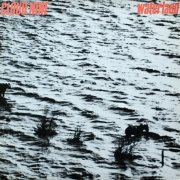 |
Waterland (1985, 23.00) ***½/½Blue GardensFraction of a Second Poison It Started When the Rain Came Waterland Wordporridge |
Current availability:
Mellotron used:
Cloud Nine were a little-known Dutch female-fronted synthpop act, whose lone release, 1985's min-album Waterland, contains material every bit as good as some of the British market leaders. Of course, the genre had pretty much run its course by the mid-'80s, which might help to explain their commercial failure. Six varied tracks actually leave you wanting more, the opposite effect to many overlong efforts, opener Blue Gardens and It Started When The Rain Came being particular highlights.
Two brothers (presumably), Richard and Joery van Buuren, played keys and wrote everything, Joery adding about two Mellotron flute chords to the title track in suitably synthpop minimalist fashion. Given that this was produced by Supersister/Nits man Robert Jan Stips, a) did he own an M400 and b) is that what we're hearing? Either way, this comes highly recommended for genre fans.
![Clouds, 'Up Above Our Heads [Clouds 1966-71]'](images/clouds-up.jpg) |
Up Above Our Heads [Clouds 1966-71] [Disc 2] (2010, 72.36) ***/½ |
|
| Watercolour Days Cold Sweat Lighthouse Long Time Mind of a Child I Know Better Than You Leavin' Get Off My Farm I am the Melody |
Make No Bones About it Heritage Why is There No Magic The World is a Madhouse Shadows Once Upon a Time A Day of Rain America (live) Clockwork Soldier |
|
Current availability:
Mellotron used:
Scots trio Clouds (originally 1-2-3) must be one of the unluckiest of many unlucky bands from the progressive era. Evolving from typical mid-'60s soul combo The Premiers, they contracted to a bass/organ/drums formation, moved to London and found themselves a deal with Brian Epstein's NEMS organisation. Epstein died soon after, leaving them in Robert Stigwood's incapable hands, before being signed to Terry Ellis' Chrysalis stable, a possible new definition for the phrase 'out of the frying pan and into the fire'. Their debut long-player, '69's Scrapbook (***), is a decent enough effort, although its orchestral arrangements (from labelmates Jethro Tull collaborator David Palmer) and mixture of organ-based progressive rock, cod-Walker Brothers material and Kinks-esque vignettes dates it badly. The following year's Up Above Our Heads (***½), aimed at a transatlantic audience and not even released at home, combined the proggier material from their debut with several new tracks, to rather better effect, while their swan song, '71's Watercolour Days (***), sounds like a band sadly out of time, in more ways than one.
Although ahead of the game at first, Clouds found their innovations being 'borrowed' by all and sundry: Yes copped their '67 arrangement of Paul Simon's America (heard here in a recording from the Marquee that year), while ELP snatched their take on B. Bumble & the Stingers' (produced by future Runaways svengali, rapist and all-round arsehole Kim Fowley) Nut Rocker, found here inserted into Up Above Our Heads' Imagine Me. The band were unhappy with most of their recorded legacy; it seems that, had they been left to their own devices (see: King Crimson), they may well have a) done better at the time and b) have left a more enduring legacy. I'm afraid there's no getting away from the fact that, today, Clouds sound like 1968 stuck in 1971; what a difference a few years can make. A 'best of' their output would make for a decent psych/proto-prog release, but their stylistic inconsistencies leave a back-to-back run-through of their original albums a rather unedifying experience.
Saying that, I'm glad that reissue specialists BGO have released Up Above Our Heads [Clouds 1966-71], fitting the first two albums (actually only one-and-a-half, of course) on disc one, with Watercolour Days and a clutch of non-album tracks and outtakes on disc two. Mellotron? This collection's liner notes refer to a pair of '71 demos of older songs for their final album, A Day Of Rain and Clockwork Soldier, keys man Billy Ritchie describing the original recordings as 'just piano and vocal with some percussion and Mellotron', adding synths 'some [unspecified number of] years later'. Hmmm. The 'synths' sound like a generic '80s/'90s digital machine, layering sampled strings over both tracks in an effort to replicate Palmer's style of arrangement, leaving... What? The background strings sitting under the sampled ones? Are they the rarely-heard M300 'two violins'? Or more generic samples? Is there actually any Mellotron here at all? I'm giving this a half-T, based on the assumption that there's something here, but I wouldn't be entirely surprised to learn that there's no actual Mellotron on these recordings at all. Clouds should be of interest to students of the era, but, at least going by their recorded legacy, they're in no danger of challenging the prog greats.
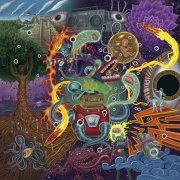 |
Now I Understand (2006, 67.19) ***/TT |
|
| Introduction Bass Beatbox Hungry Ghosts Quilty Vishnu Dub A Toy for a Boy Luminous Things What Would Cthulhu Do? |
Now I Understand And Shadow Saw the Gods Wetbones (extended) Vision of Kali Just Kiddin |
|
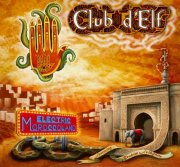 |
Electric Moroccoland/So Below (2011, 152.20) ***/TTT |
||
| Overture Sand (for Mark) Ghir Khoudouni Madrecita Sunshine of Your Love Scorpionic Mogador Bendir Done That Berber Song |
Sidi Rabi Ambib Instar Rope on Fire Gettin' Squinty Middle Pillar So Below Salvia |
I Wish I Was in Heaven Sitting Down Trance Meeting, pt. 1 Trance Meeting, pt. 2 As Above End of Firpo Pharaoh Propeller Taint Too |
|
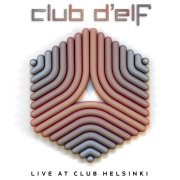 |
Live at Club Helsinki (2017, 126.45) ***/TT |
|
| Mogador Africa The Booloolu Hegaz Secret Atom Berber Song Al-Hadra Zeed Al Maal |
Power Plant Salvia Green Screen Sidi Rabi |
|
Current availability:
Mellotrons used:
Despite existing since the late '90s, 2006's Now I Understand is Club d'Elf's first studio album, its seven predecessors all being live. Huh? Seems it's a semi-improvisational ensemble with an ever-changing cast, helmed by bassist Mike Rivard (Paula Cole, Aimee Mann, Jon Brion), who has constructed this largely instrumental album over a period of some years, involving loads of musicians, not least Reeves Gabrels (Tin Machine), Mat Maneri, DJ Logic and the ubiquitous John Medeski. It's... well, er... OK, try 'North African trance-dub from Boston'; very rhythmic, very trancey, pretty experimental while remaining danceable, if that sounds like your bag.
Medeski plays Mellotron amongst other things, of course, with what sounds like a single Chamberlin male voice note on Introduction, although it could, of course, be a sample, or indeed, something else entirely. Bass Beatbox features a repeating high cello run (or is it Maneri's electric viola?) with a few seconds of strings at the end, low choir notes and heavily manipulated flutes on the fabulously-titled What Would Cthulhu Do? and pitchbent strings on the title track. This isn't going to appeal to everyone, by any means (or even everyone who reads this site, which is another matter entirely), but those who follow Medeski's career may find something here to interest them. Typical Medeski Mellotron work, but (as usual) it's not overdone. Interesting, but I shan't be returning here too soon.
And I thought that was weird... 2011's Electric Moroccoland/So Below is not only seriously out there, it's also seriously long, so unless two-and-a-half hours of skronky, jazz-fuelled, world music-informed weirdness sounds like your bag, you might wish to go elsewhere. This isn't a criticism, you understand, merely a description; this is impeccably constructed, just not an album for those not prepared to put quite a lot of work into it. Plenty of Medeski's Mellotron, with mildly dissonant strings and cellos on Madrecita, background, pitchbent choirs on their bizarre take on Cream's Sunshine Of Your Love, high cellos and strings on Scorpionic, cellos on Mogador, warbly flutes and wildly pitchbent strings on Sidi Rabi, high cellos on Ambib, Flutes on Instar, what sounds like the odd flute note on Rope On Fire and flutes on Salvia, for what it's worth.
2017's Live at Club Helsinki does what it says on the tin, this time a mere two-ish hours of live improv, possibly at its best on the ripping Berber Song. Complaint? Far too long for the casual listener, but then, I can't imagine that they're aiming at us. Medeski's approach seems to be to concentrate on one instrument, however long the piece, making some piano-based, some organ etc. Three Mellotron tracks, with strings all over Africa, background strings on Berber Song, moving into full-on pitchbend madness and what sounds like bassoon and chordal strings on Salvia. Nice to hear someone using anything other than the same old handful of sounds, too.
 |
Variants (2019, 57.17) ***½/TWe Come WillinglyFruit Falls From the Apple Tree Who Are the Strange The Lamb Black Eyes Singing Camberwell Beauty Two Horratia Positive Negative |
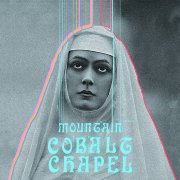 |
Mountain (2019, 25.59) ***½/TMountainBohemia Canticle Mountain (edit) |
 |
Download (2020) ***/½ Witches in These Parts (Cobalt Chapel remix) [by Mzylkypop] |
Current availability:
Mellotrons used:
Cobalt Chapel are another project from Jarrod 'Regal Worm' Gosling, this time a duo with Cecilia Fage, whose first, eponymous 2017 album (****) is a thing of beauty, albeit one free of any Mellotronic involvement. Two years on, Variants is described on its Bandcamp page as 'the first album, reimagined and reincarnated through a spectral prism of dreamlike drones and psychedelics', its material converted into drifting waves of vintage ambience, possibly at its best on the harmonium-fuelled Fruit Falls From The Apple Tree, The Lamb and Black Eyes. Jarrod's Mellotron only obviously appears on one track, with flutes all over Singing Camberwell Beauty, although I'm giving the distant flutes on Two the benefit of the doubt, too.
The same year's Mountain EP shows another side to the duo, far more rhythmic and synth-led than before, at its best on the ten-minute Canticle, which merges the disparate styles the most effectively. Jarrod plays occasional Mellotron strings on Canticle, until a mad, angular flute melody suddenly appears out of nowhere most of the way through, with cello and strings parts thrown into the mix. Their remix of Mzylkypop's Witches In These Parts has a lot in common with Mountain (song, not EP), being an energetic indie effort, a few seconds of Jarrod's Mellotron strings apparent at one point.
See: Regal Worm | I Monster | Skywatchers
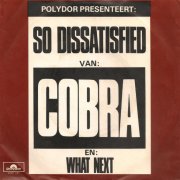 |
7" (1972) ***½/T So Dissatisfied What Next |
Current availability:
Mellotron used:
Fronted by Rob Vunderink, Cobra released a handful of singles across the '70s, in a commercial-hard-rock-of-the-period vein (see: Blue Planet). I've seen a reference to So Dissatisfied's author being Fleetwood Mac's Christine McVie, but it doesn't appear to've been recorded by her, either with the band or solo. Anyway, it's a decent hard rock effort, while the flip, What Next, is a portentous proggy number, Vunderink declaiming about the world's problems over a mildly turgid backing.
Someone plays low, chordal strings on the flip, to reasonably pleasing, if not entirely essential effect. Both sides can be found on Universal's The Golden Years of Dutch Pop Music: Seventies Nuggets, or, more cheaply (in fact, for free) on YouTube.
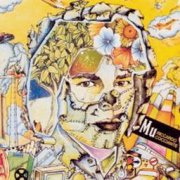 |
Mu (1972, 37.45) ***/T |
|
| Introduzione I Parte Ora Che Io Sono Luce Coltivò Tutte le Valli II Parte Uomo Festa III Parte Era Mattino Sul Mondo Vita |
IV Parte A Dio Corpi di Creta |
|
Current availability:
Mellotron used:
Born in what was to become Vietnam, the Italian/French Riccardo Cocciante moved to Italy at the age of eleven, releasing his first album, Mu (doubtless named for the legendary lost continent) in 1972. It's another of those Italian pop/prog efforts that were so popular in the country at the time, essentially a singer-songwriter album wearing a progressive overcoat, although a few tracks, notably closer Corpi Di Creta would almost pass as 'proper' prog.
Maurizio Giammarco and Paolo Rustichelli (of Rustichelli & Bordini) play Mellotron, with strings on Uomo (part one of II Parte) and Era Mattino Sul Mondo (part one of III Parte), with rather more on the latter than the former. Overall, not a bad effort, vaguely in the vein of Dallaglio's Sera - Mattina, albeit better, but with less Mellotron. Worth hearing if you've already exhausted the almost bottomless pit of Italian '70s prog.
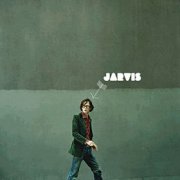 |
The Jarvis Cocker Record (2006, 49.25) ****/T |
|
| The Loss Adjuster (Excerpt 1) Don't Let Him Waste Your Time Black Magic Heavy Weather I Will Kill Again Baby's Coming Back to Me Fat Children From Auschwitz to Ipswich |
Disney Time Tonite Big Julie The Loss Adjuster (Excerpt 2) Quantum Theory Running the World |
|
Current availability:
Mellotron used:
Jarvis Cocker's first post-Pulp album has been eagerly awaited, coming, as it does, five years after his ex-band's last effort, the underrated We Love Life. Fans need not worry, although I suspect that most of them bought this when it came out, not three years later, as I review it. It's excellent, packed to the gills with (sorry, Jarvis) Pulp-like post-Britpop, doubtless partially due to guitarist Steve Mackey's involvement, overlaid by the man's beautifully wry observations. 'Best tracks' is a difficult one, when the lyrics are as important as the music, not to mention pretty much universally superb. Maybe Fat Children and I Will Kill Again, although nothing here disappoints.
Jarvis plays various aged keyboards (Solina, Roland SH1000, Memorymoog), plus specifically-credited Mellotron flutes on I Will Kill Again, with a part running right through the song. All in all, then, an extremely worthy effort, should you be into Jarvis' thang, although its tape-replay content is fairly minor. And what the hell is a 'parental guidance - explicit content' sticker doing on the CD case?
Incidentally, although it should now be considered heavily passé, there's a twenty-five-minute gap between the last credited track, Quantum Theory and the last actual one, Running The World, the silence omitted from the disc timing above. Also incidentally, given that this is being written just after Michael Jackson's untimely death, now might be a good time to remember Jarvis' fabulous intervention during the late Wacko's horrific performance of the hideous Earth Song at the 1996 BRIT Awards, where the great man got up onto stage and waggled his arse at the cameras in protest. The media storm was a) inevitable, b) excessively tedious and c) excellent publicity. Also also incidentally, I lent a band some equipment during Jarvis' curatorship of the 2007 Meltdown Festival in London. The musician to whom I'd lent said vintage gear (no, not my Mellotron) was nowhere to be found after the gig, being too busy ligging backstage, leaving us to pack the gear up ourselves, but Mr. Cocker held a door open for us as we staggered out carrying heavy flightcases. Jarvis Cocker, you are a gentleman.
See: Pulp
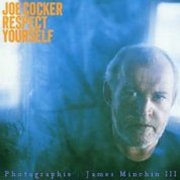 |
Respect Yourself (2002, 48.51) **½/½ |
|
| You Can't Have My Heart Love Not War You Took it So Hard Never Tear Us Apart This is Your Life Respect Yourself I'm Listening Now Leave a Light on |
It's Only Love Every Time it Rains Midnight Without You |
|
Current availability:
Chamberlin used:
Nearly forty years on, Joe Cocker is still best-known for his excellent deconstruction of the Beatles' With A Little Help From My Friends and his performance of such at Woodstock, although some may remember his 1983 duet with Jennifer Warnes (who she, anyway?) with the vile Up Where We Belong, all of which negates his great white soul/blues voice. Sadly, it seems said voice is usually persuaded to sing dreck; while most of Respect Yourself doesn't fall into that category, it's still a bland soul/AOR album for his middle-aged fans. Other reviewers seem to like the brass-driven title track, but I can't personally find any highlights at all. This is not an exciting album.
The inimitable Patrick Warren plays Chamberlin on three tracks, with background strings on You Took It So Hard, then nothing obvious on either Never Tear Us Apart or Leave A Light On, although the strings on closer Midnight Without You sound more 'Chamby' than anything else on the album (Warren is credited with simply 'keyboards' on the song).
 |
The Coctails (1996, 56.24) ***/T |
|
| When I Come Around Circles City Sun Cadali So Low Grace Starling Never Knew |
Low Road Hey Sun is Down Cast Stones Last Organ |
|
Current availability:
Mellotron used:
The Coctails formed in the late '80s, busying themselves with an eclectic combination of influences, including jazz and what was soon to become known as 'lounge', about as unfashionable as it was possible to get for some decades by this point. Unfortunately for the band, they became unwittingly caught up in the fashion-victim lounge revival of the mid-'90s, which probably hastened their premature split. 1996's The Coctails was their fourth and last album, mostly consisting of gentle, often instrumental material, the exception being the indie/rock of Cast Stones, better examples including the vibraphone-heavy loungecore of Circles, So Low and Mark Greenfield's beautiful harmonium-fuelled closer, Last Organ.
Archer Prewitt (subsequently of The Sea & Cake) plays a beautifully upfront Mellotron flute part on Starling, although all other possible sightings appear to be real instruments. It's hard to know to whom to recommend this, although those of you who appreciate the quieter things in life may just possibly go for it; whether the presence of one excellent Mellotron track makes any difference to you is something only you can decide.
See: Archer Prewitt